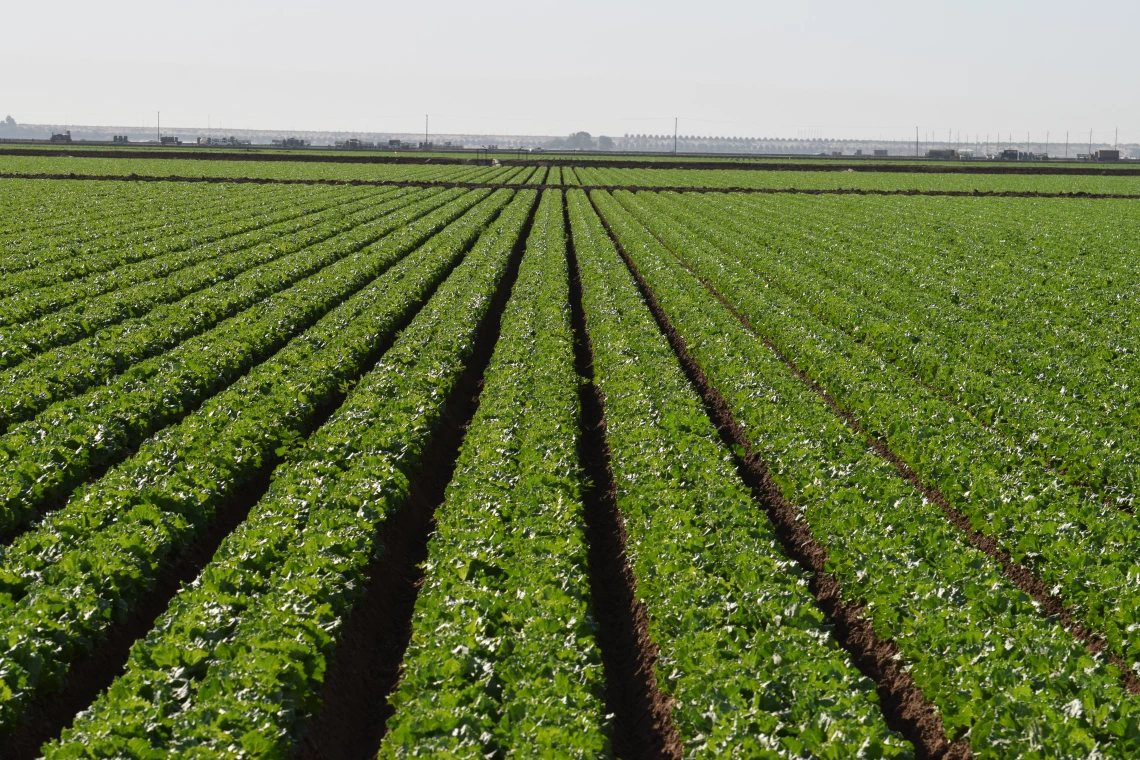Supporting innovative solutions for desert agriculture

Yuma Center of Excellence for Desert Agriculture
As water levels at Lake Mead – the nation's largest reservoir – continue to drop to historic lows, a hydrological numbers crunch is playing out in the Southwest, with big implications for Arizona agriculture.
The Colorado River system supplies water to over 40 million people, irrigates over 5.5 million acres of agricultural land, and supplies hydropower to eight states. Amid severe and prolonged drought, water levels across the system have dropped to dangerous levels, with elevations at Lake Mead falling more than 150 feet since 2000, according to the U.S. Bureau of Reclamation.

“Arizona faces a major threat from drought. On the Colorado River, we face the chance of the whole system crashing,” said Paul Brierley, executive director of the University of Arizona’s Yuma Center of Excellence for Desert Agriculture.
A public-private partnership, the Yuma Center of Excellence for Desert Agriculture, or YCEDA, was formed in 2014 to provide rapid response to the pressing issues facing desert agriculture production. The center has worked on a variety of issues – such as soilborne disease mitigation, and irrigation and soil salinity management.
Under Brierley’s leadership, YCEDA is wrapping up a seven-year, multimillion dollar irrigation efficiency study utilizing U.S. Department of Agriculture and UArizona researchers, which aimed to quantify existing irrigation and salt management practices and identify opportunities for improvement. As water scarcity continues, the study’s outputs can help growers further refine what water is needed for a crop and maintain a healthy and sustainable soil salt balance.
Additionally, YCEDA is coordinating research with the Arizona dairy industry on minimizing dairy’s water footprint – especially through producer adoption of improved crop production techniques. The research is being performed by top Cooperative Extension researchers from around the state in the areas of dairy, agricultural economics, agronomy, and soil health.
This past December, Brierley’s expertise was called upon to chair the University of Arizona’s Presidential Advisory Commission on the Future of Agriculture and Food Production in a Drying Climate, with the charge to recommend actions the university can take to address the challenges facing agricultural production, as well as food and economic security in the state and around the world.
"As a rapidly drying climate threatens food and agriculture systems around the globe, Arizona's agriculture industry will need innovative solutions to continue producing food and other goods year-round for the state and beyond," said UArizona President Robert Robbins in the December announcement.
“Arizona is the obvious place to solve this problem of keeping agriculture productive in a drying climate,” Brierley said. “Our commission will focus UArizona’s vast expertise on innovations that will ultimately help people and communities thrive.”
A matter of food and economic security
In announcing the commission and its charge, Robbins underscored the fact that Arizona’s ability to be agile and resilient in the face of current water challenges affects not only agricultural production and food security, but also the vitality of rural communities.
Brierley frequently points to the Yuma area, where from November through April, 90% of North America’s leafy green vegetables are grown. The area produces 1 billion pounds of lettuce a month, or roughly 170 million servings per day.
“Yuma’s resources of water, soil, climate, labor, and infrastructure have allowed generations of farmers to build an efficient productive agricultural ecosystem,” he said. “There's no place else that you can put out this kind of volume of fresh produce in the wintertime.”
State-wide, Arizona agribusiness contributes a record $23.3 billion in sales to the state's economy (based on 2014 data), according to a report by the University of Arizona Cooperative Extension’s Economic Impact Analysis Team, and directly and indirectly supports more than 138,000 full- and part-time jobs.
Brierley grew up working on his family's diversified central California farm – which grew sugar beets, cannery tomatoes, alfalfa, wheat, vegetables, and flowers for seed – and he knows the stakes.
"When we talk about agricultural sustainability, farmers and ranchers must be able to make a living doing what they do. Generations of knowledge and hard-earned experience have taught them how to make the land as productive as they can, while being good stewards of our resources,” he said.
As chair of the commission, Brierley has worked to ensure producers’ knowledge and expertise are brought to the table. This spring, the commission engaged internal and external stakeholders in focus groups, discussions, and workshops across the state.
In March, members of the commission were invited to a listening session to hear from people in the Yuma area. Rob Nickerson offered the committee members a private tour of his farm’s expansive vegetable-growing operations.
“Our visit to Nickerson Farms opened my eyes to the scale and modernity of agriculture in the Yuma, Arizona area,” said Luisa Ikner, a member of the President’s commission and an assistant professor in the Department of Environmental Science. “The importance and security of the Colorado River water supply in maintaining the productivity of growers like Nickerson Farms is vital to ensure food security for all of us.”
In supporting the state’s agricultural producers, the commission will stress the importance of scalable technologies and solutions to the water challenges facing the state.
"There are literally hundreds if not thousands of ideas to make agriculture more sustainable, from drip irrigation and water treatment to soil amendments and low-water-use crops to drones and robotic weeders and harvesters," Brierley said. “The key is to get the right combination of technologies and practices into the hands of tomorrow's agricultural producers. The University of Arizona can and should play a key role in making that happen."

